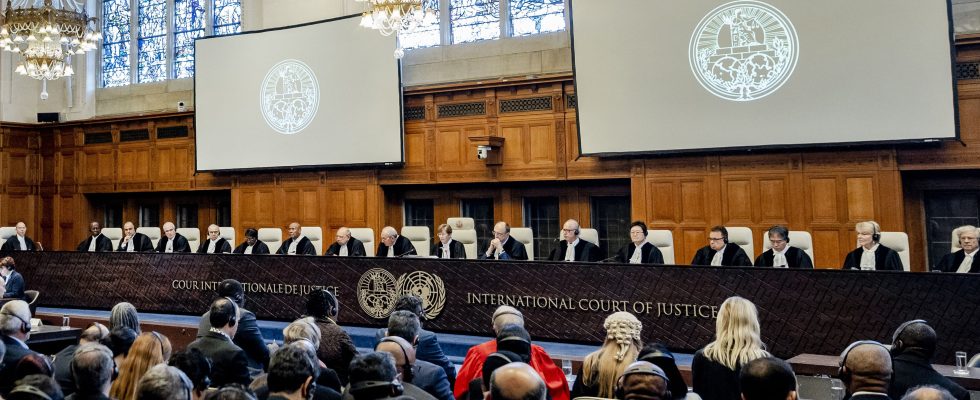The decision of the International Court of Justice was eagerly awaited. The highest court of the UN called on Israel on Friday January 26 to do everything possible to prevent any act of “genocide” in the Gaza Strip and to allow humanitarian aid to enter.
The court called on Israel to refrain from any possible genocidal act while Benjamin Netanyahu’s government continues its military operation in the Gaza Strip, but did not mention a ceasefire. Israel must take “immediate and effective measures to enable the provision of basic services and humanitarian assistance that the Palestinians urgently need to address the unfavorable living conditions faced by the Palestinians”, the court ruled. The proceedings were brought by South Africa, which claims that Israel is violating the 1948 United Nations Genocide Convention, established in the aftermath of World War II and the Holocaust.
At this point, the ICJ is not ruling on whether Israel is committing genocide in Gaza. This part of the procedure can take years. But the court called on Israel to “take all measures in its power to prevent” a “genocide”. She also said Israel should “prevent and punish” any incitement to genocide.
“Scandalous” accusations, says Netanyahu
Benjamin Netanyahu was quick to react, deeming the accusations of “genocide” in Gaza “scandalous”. “The despicable attempt to deny Israel” the “fundamental right” to defend itself is “blatant discrimination against the Jewish state, and it has been “rightly rejected,” the Israeli prime minister said. “Our war is against Hamas terrorists, not against Palestinian civilians,” added Benjamin Netanyahu in a message in English published on social networksaffirming that the Israeli government “will continue to do what is necessary to defend our country and our people.”
Quoted by the Israeli newspaper Times of Israelthe Minister of National Security Itamar Ben-Gvir, on the far right of the ruling coalition, reacted to this decision by charging the ICJ: “The decision of the anti-Semitic court in The Hague proves what the we already knew: this court does not seek justice, but rather the persecution of the Jewish people. It remained silent during the Holocaust and, today, it continues its hypocrisy and takes a new step,” he said. declared, adding that “decisions that endanger the existence of the State of Israel must not be listened to” and that the Jewish state must “continue to defeat the enemy until total victory is achieved.
“A decisive victory” says South Africa
For its part, South Africa immediately reacted, welcoming a “decisive victory for the international rule of law and an important step in the quest for justice for the Palestinian people”, following the hearing of the ICJ in The Hague. The South African Ministry of Foreign Affairs considers, in its press release, that the Court “has determined that Israel’s actions in Gaza are plausibly genocidal and has indicated provisional measures on this basis”, thanking it “for its rapid decision” .
Pretoria vows to continue to “act” internationally “to protect the rights, including the fundamental right to life, of Palestinians in Gaza – who remain exposed to urgent risks, including Israeli military assault, famine and illness,” added the press release. South Africa will continue to do everything to “preserve the existence of the Palestinian people as a group, to put an end to all acts of apartheid and genocide” against them and to “march with them towards the realization of its collective right to self-determination”, continues the Ministry of Foreign Affairs.
Finally, Hamas also reacted in a statement, welcoming a decision which would be “an important development” which “contributes to isolating Israel” to “denounce its crimes” in the Gaza Strip.
This decision, although it has no binding power, could nevertheless have a strong political impact on the continuation of the conflict in the region. “It is much more difficult for other states to continue to support Israel in the face of a neutral third party who believes that there is a risk of genocide,” Juliette McIntyre, an expert in international law at the University, analyzed for AFP. from South Australia. “States could withdraw their military or other support for Israel in order to avoid this,” she added, further emphasizing the “enormous” symbolic impact of any decision rendered against the Jewish state under the Convention on genocide, given its history.
